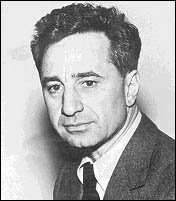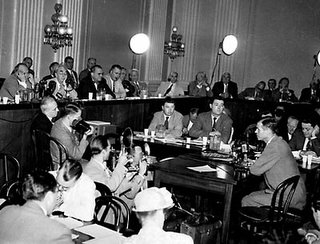Kazan, McCarthyism and On The Waterfront

Elia Kazan was born in Constantinople (now Istanbul) on September 7th 1909. Kazan directed many films ranging in time from 1937 to 1976. During this time Kazan was able to direct some of the most powerful movies of his time. these include:
- Streetcar Named Desire
- Viva Zapata
- East of Eden
- America, America
- On The Waterfront
- Gentleman's Agreement
Elia Kazan was awarded 2 best director awards from the Academy Awards for his work on Gentleman's Agreement and On the Waterfront.
Besides being known for such standout movies as listed above, Kazan is also known for another event that shaped the future of American Culture and Filmmaking. Kazan Testified in 1952 in front of the House Un-American Activities pointing out supposed Communist in the film industry. During the testimony he "gave the committee the names of eight supposed communists who were subsequently blacklisted in hollywood" (infoplease.com). The eight people that Kazan named as communists were some of his old friends from "the Group Theatre who in the 1930s, along with him, had been members of the American Communist Party" (pbs.org). The reason why this was such a changing affect on American Culture and film is simply the fact that these people were subsequently blacklisted from Hollywood and were no longer able to direct, act in Hollywood. Many of these individuals were left without work and some even fled the country. This in turn changed the landscape of filming forever and many too this day disagree with blacklisting in Hollywood. Much of this had stembed when a " young Senetor Joseph McCarthy made a public accusation that more than two hundred "card carrying" communists had infiltrated the United States Government" (pbs.org).
Some people even make a connection between Kazans own ordeal and his so called redemption two years later through the film On the Waterfront. Although the two individuals ordeals are different in nature, both Kazan and Malloy had to choose what avenue to take. you could even make the argument that Elia Kazan was trying to portray his ownself in the movie through Terry Malloy as upstanding and moral, and that the choice he made was the right one.
references:
http://www.infoplease.com/spot/kazan1.html
http://www.imdb.com/name/nm0001415.bio
http://www.pbs.org/wnet/americanmasters/database/kazan_e.html
http://www.pbs.org/wnet/americanmasters/database/mccarthyism.html
photos:
http://www.einsiders.com/features/columns/sept03obituaries.php
http://www.infoplease.com/spot/kazan_e.html

1 Comments:
hi,
nice info. i hope you update you weblog soon and put in more interesting stuff.
ali
shocks6@yahoo.com
Post a Comment
<< Home